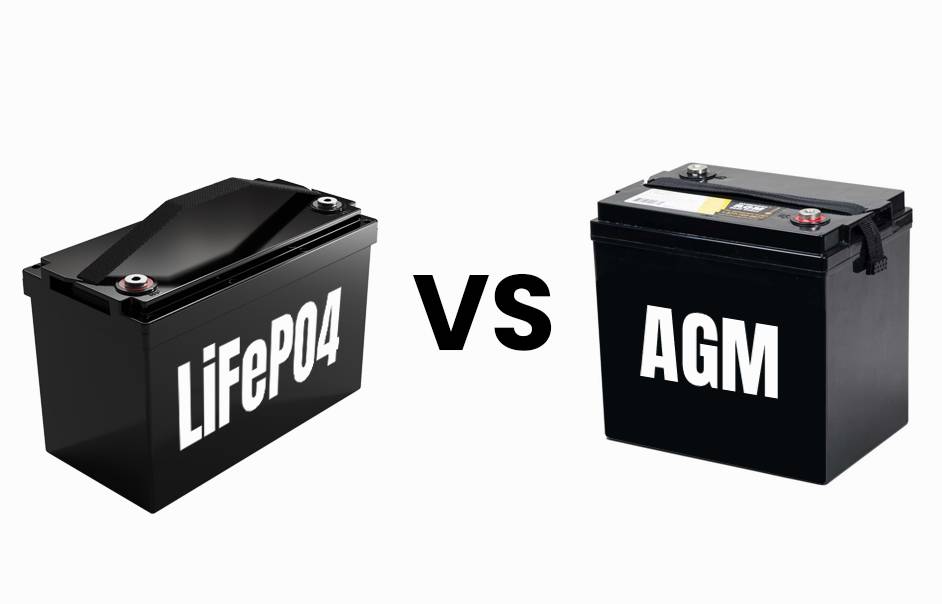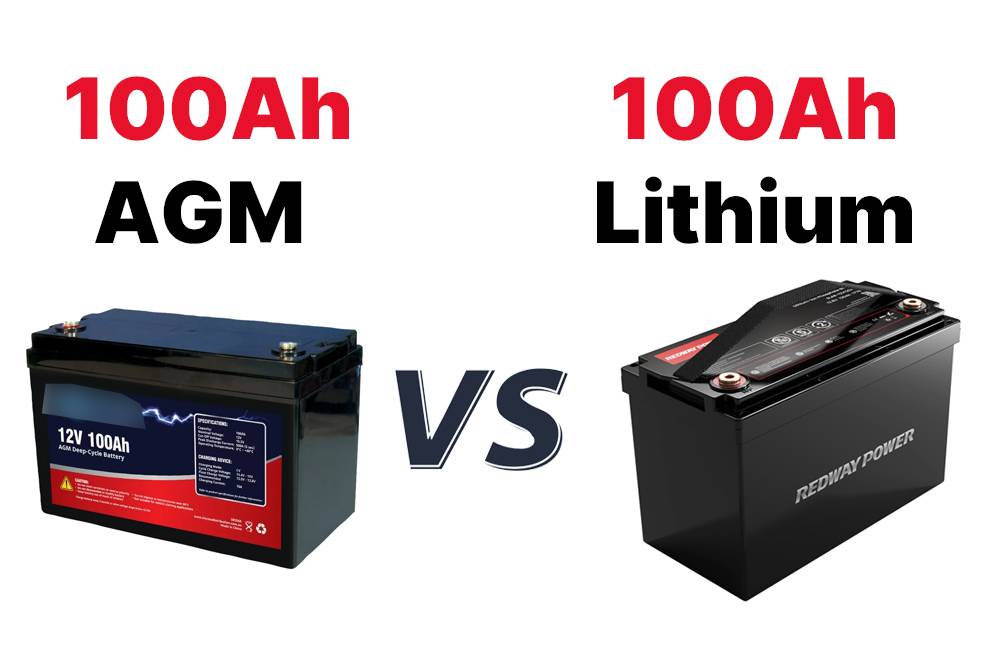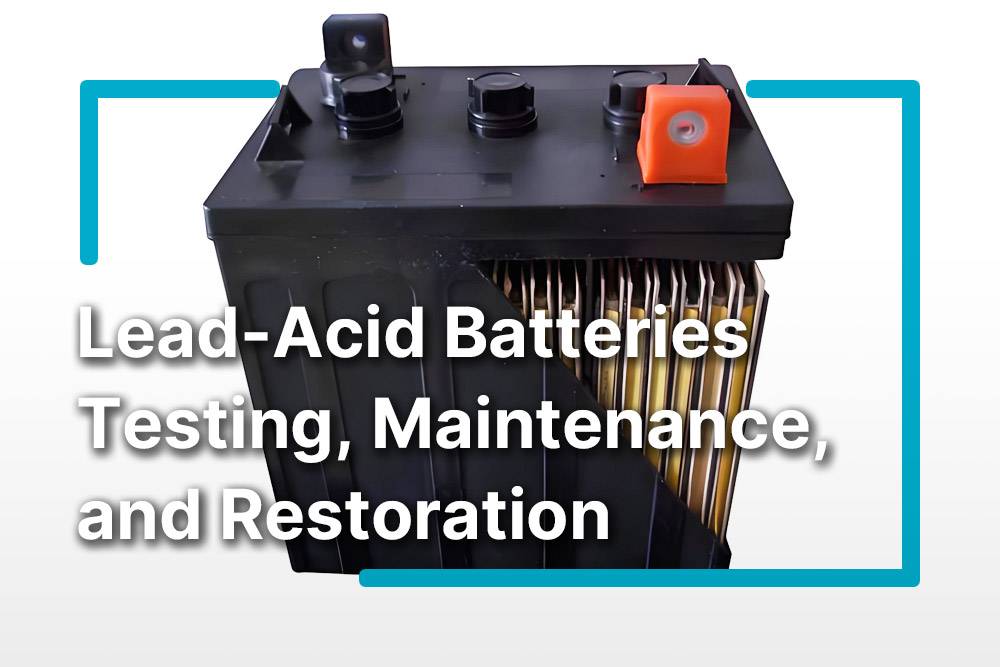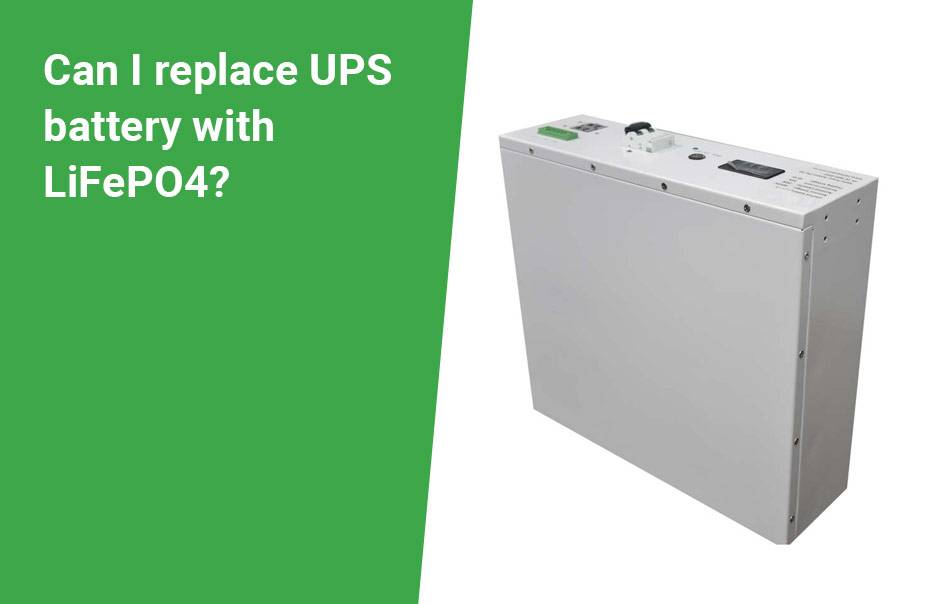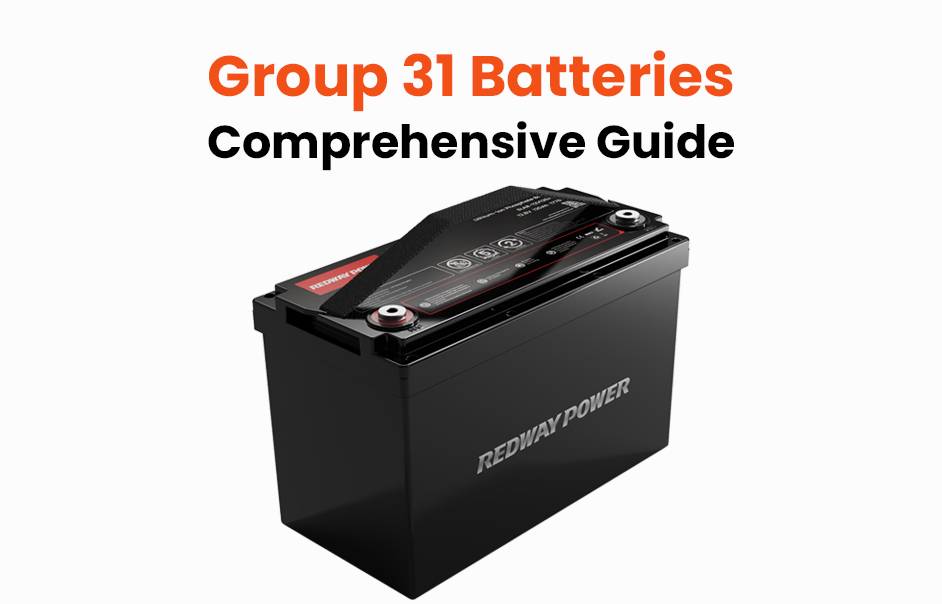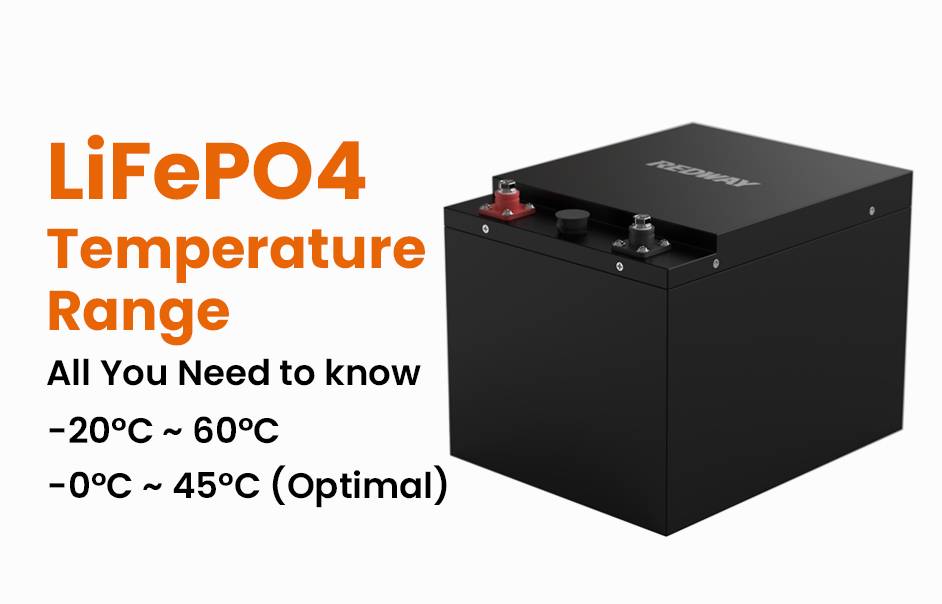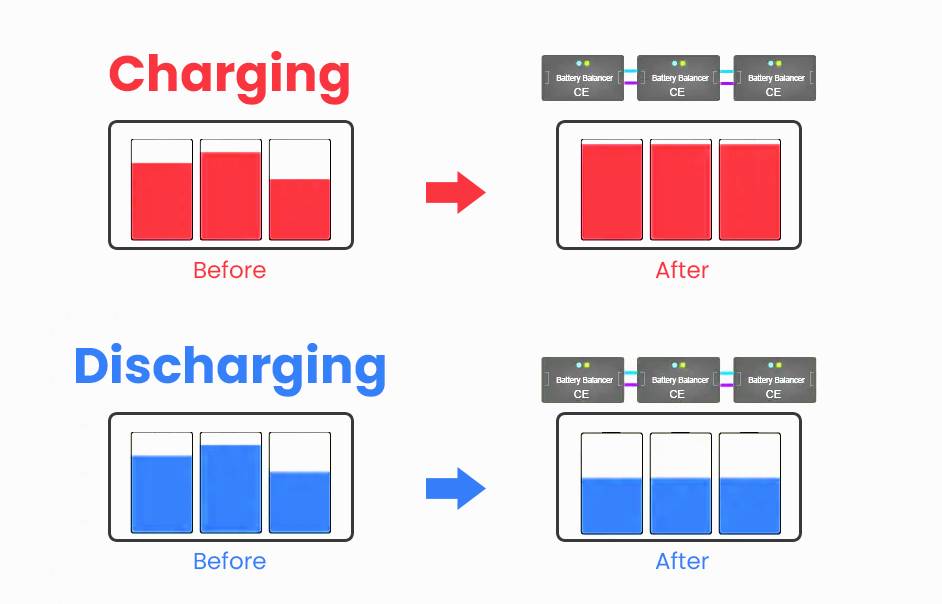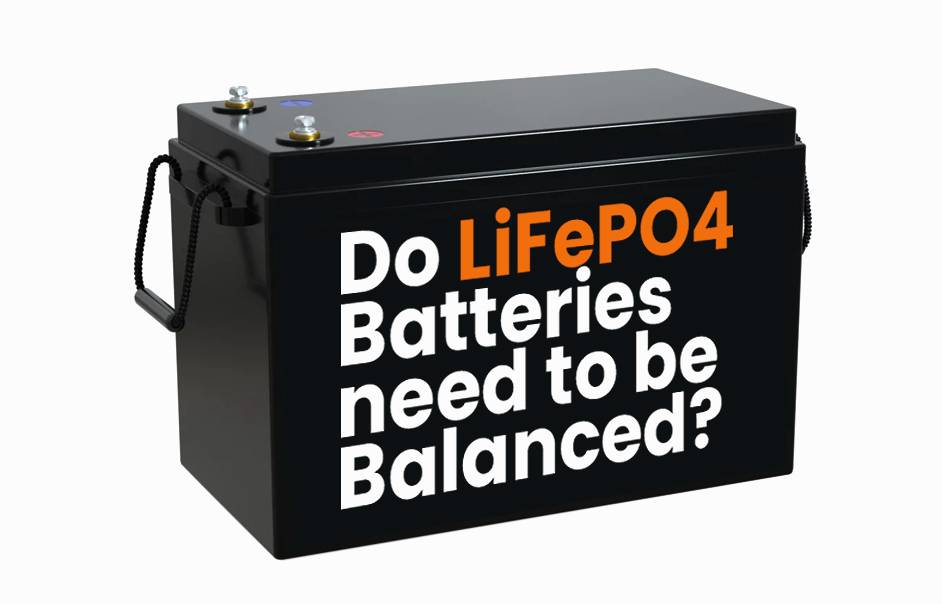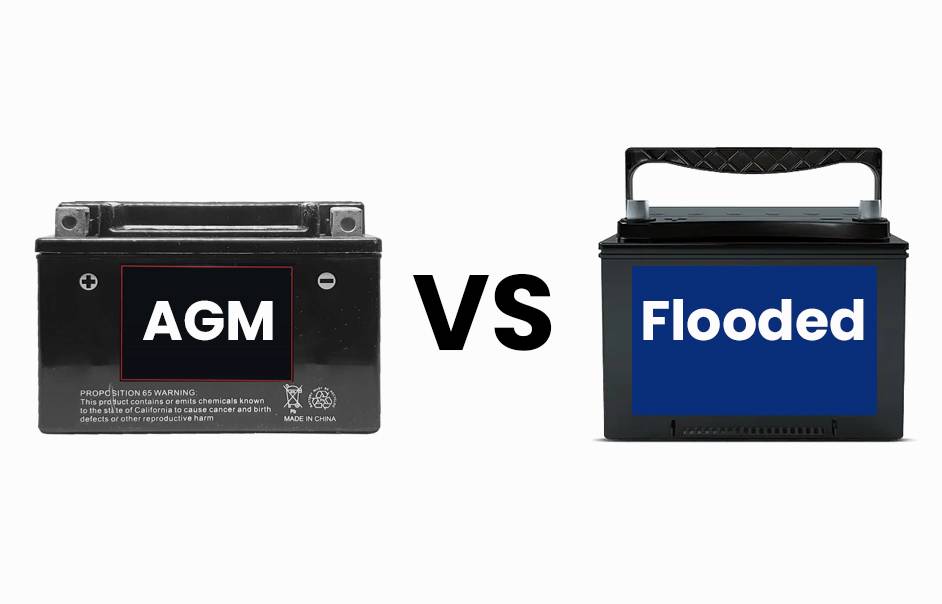Embark on a thorough exploration of battery options with our guide comparing LiFePO4 and AGM batteries. Whether you’re off-grid or embracing solar energy at home, choosing the right battery is crucial. Delve into the nuances of advantages, disadvantages, costs, and real-life applications. This comprehensive journey equips you with the knowledge to power up effectively. Join us for an informative dive into the battery landscape – let’s get started!
What are LiFePO4 and AGM Batteries?
LiFePO4 and AGM batteries are commonly used in various applications, each with unique characteristics.
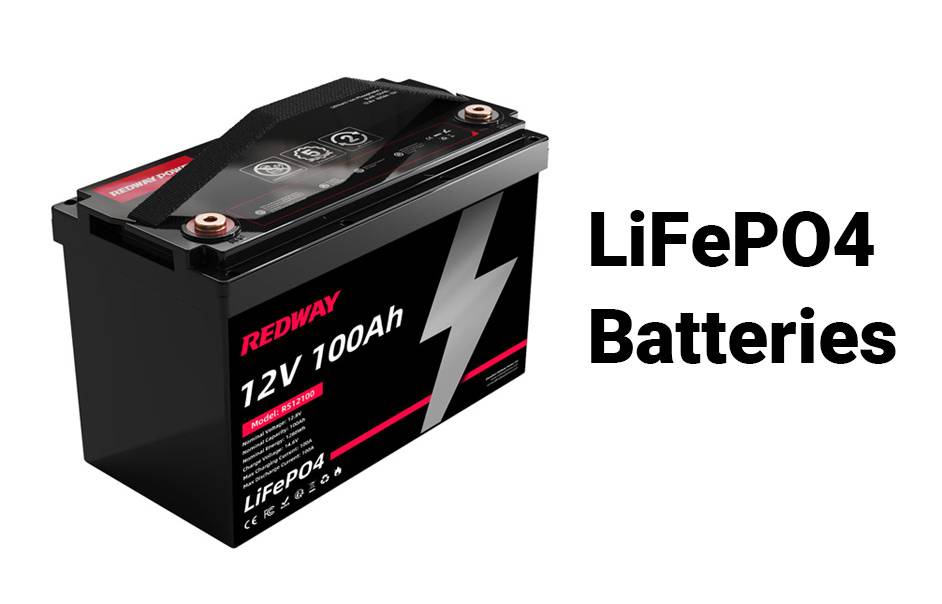
- LiFePO4 Batteries:
- Known for high energy density and longer lifespan.
- Faster charging and high discharge resilience.
- AGM Batteries:
- Maintenance-free and resistant to vibration.
- Lower internal resistance for efficient power transfer.
- Considerations for Choosing:
- LiFePO4 may be more expensive upfront but offers a longer lifespan.
- AGMs are suitable for rugged environments but may struggle with deep discharges.
Understanding these differences is crucial for selecting the right battery based on cost, capacity, and durability for your specific needs!
Advantages of LiFePO4 Batteries
LiFePO4 batteries, also known as lithium iron phosphate batteries, have become increasingly popular due to their exceptional advantages in recent years.
- Impressive Energy Density:
- These batteries excel in storing a substantial amount of energy within a compact size, making them well-suited for diverse applications.
- Long Lifespan:
- In contrast to traditional lead-acid batteries, LiFePO4 batteries exhibit an extended lifespan, lasting for thousands of charge cycles with minimal capacity loss. This translates to reduced maintenance and replacement needs, resulting in significant time and cost savings.
- High Efficiency:
- Renowned for their high efficiency levels, LiFePO4 batteries deliver power rapidly. This characteristic facilitates swift charging and discharging, providing flexibility for various energy requirements.
- Lightweight and Compact:
- Their lightweight and compact design make LiFePO4 batteries easy to install and transport. This feature positions them as an excellent choice for portable devices, including electric vehicles and solar power systems, where weight and space constraints are critical considerations.
- Superior Safety Features:
- LiFePO4 batteries boast superior safety features compared to other battery chemistries. Their composition, devoid of volatile materials like lithium cobalt oxide, results in a lower risk of thermal runaway or explosion, ensuring enhanced safety in usage.
- Versatile Applications:
- The advantages of LiFePO4 batteries make them an attractive option across various industries, including renewable energy storage systems, electric vehicles, marine applications, and telecommunications equipment.
In conclusion, LiFePO4 batteries stand out as a compelling choice for advanced energy storage solutions, offering a blend of longevity, efficiency, and safety across diverse applications.
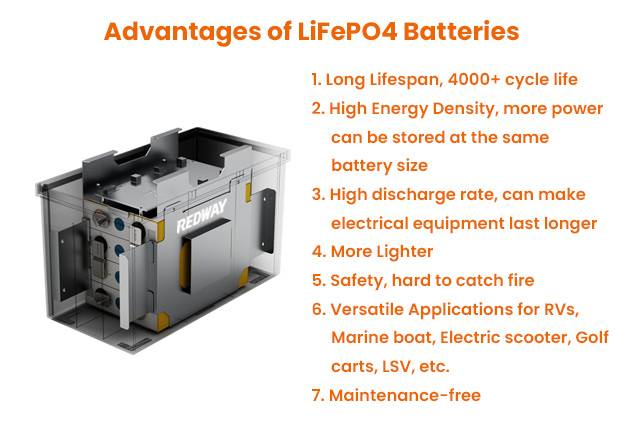
Advantages of AGM Batteries
AGM batteries, or Absorbent Glass Mat batteries, stand out as a popular choice in diverse applications due to several notable advantages.
- Maintenance-Free Convenience:
- AGM batteries eliminate the need for regular watering or electrolyte checks, providing a maintenance-free solution compared to traditional flooded lead-acid batteries. This convenience enhances user experience and reduces hassle.
- Versatile Installation:
- Their ability to be mounted in any position without the risk of acid leakage offers exceptional flexibility in installation. This makes AGM batteries well-suited for vehicles and boats where space constraints may be a consideration.
- Durability in Rough Conditions:
- AGM batteries exhibit high resistance to vibration and shock, ensuring reliable performance even in challenging conditions. This durability makes them an excellent choice for off-road vehicles and marine applications.
- Low Self-Discharge Rate:
- AGM batteries maintain a lower self-discharge rate compared to other battery types, allowing them to hold a charge for longer periods without frequent recharging. This makes them ideal for backup power systems and secondary energy sources.
- Fast Charging Capability:
- With low internal resistance and the ability to accept higher charging currents, AGM batteries offer faster charging rates. This feature enables users to quickly recharge their battery packs when needed, enhancing overall efficiency.
AGM batteries emerge as a reliable choice for automotive, marine, RVs/campers, and solar energy systems. Their maintenance-free nature, versatility, durability, and fast-charging capabilities make them appealing for those seeking dependable power storage solutions.
Disadvantages of LiFePO4 Batteries
Despite the numerous advantages of LiFePO4 batteries, it’s crucial to consider their drawbacks before making a decision.
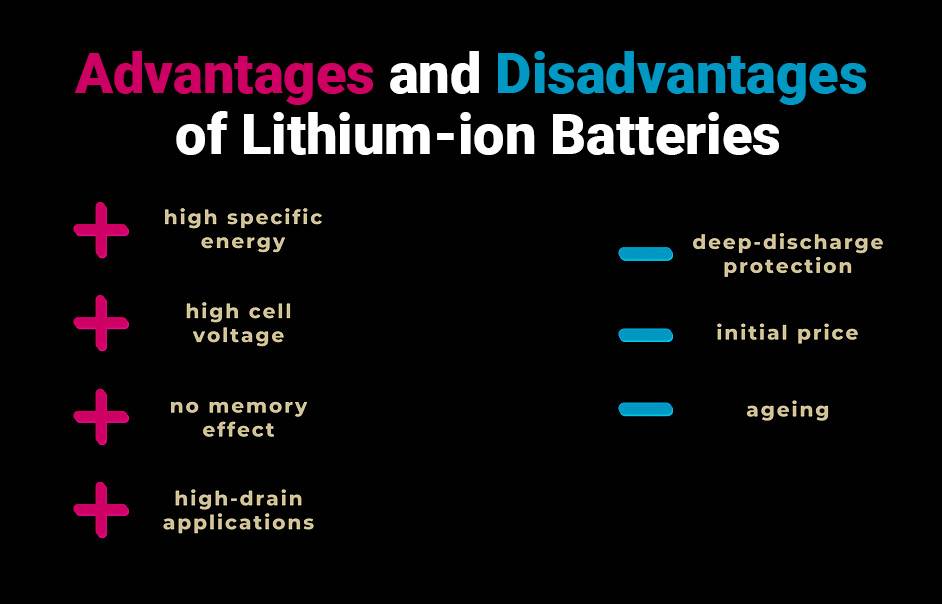
- Higher Initial Cost:
- LiFePO4 batteries come with a higher initial cost compared to AGM batteries. The technology involved in their manufacturing contributes to this expense, impacting the overall purchase price.
- Size and Weight Concerns:
- LiFePO4 batteries are larger and heavier than AGM counterparts. This can be a disadvantage, particularly in applications where space or weight limitations are critical factors.
- Lower Energy Density:
- In comparison to some other battery chemistries, LiFePO4 batteries exhibit lower energy density. This implies they may not deliver as much power output per unit size, which could be a consideration depending on specific power requirements.
- Monitoring and Management:
- LiFePO4 batteries necessitate careful monitoring and management of charging and discharging cycles. Adhering to specific voltage requirements is essential to maintain optimal performance and lifespan.
- Degradation Over Time:
- While LiFePO4 batteries boast a longer lifespan, they still experience degradation due to repeated use and aging factors. Regular maintenance and monitoring are crucial to ensure prolonged functionality.
While LiFePO4 batteries have notable disadvantages, the choice between this technology and alternatives like AGM batteries depends on individual needs and priorities. Factors such as cost, size, energy density, and maintenance requirements play a crucial role in the decision-making process.
Disadvantages of AGM Batteries
While AGM batteries offer advantages, it’s essential to consider their drawbacks, influencing your decision-making process.
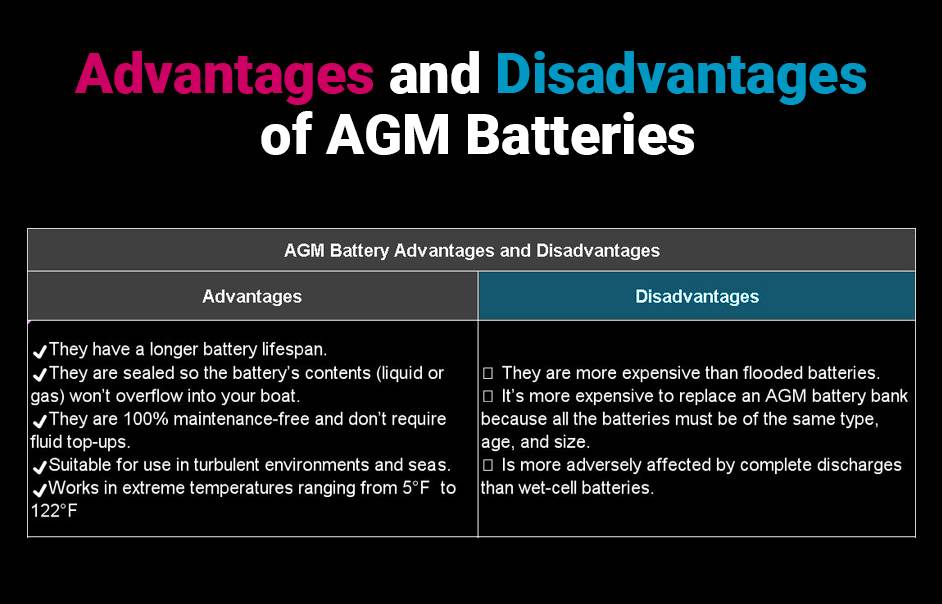
- Temperature Sensitivity:
- AGM batteries are sensitive to high temperatures, leading to reduced performance and potential permanent damage in extreme heat. This can be problematic in hot climates or outdoor applications.
- Limited Lifespan:
- AGM batteries have a shorter lifespan (around 3-5 years on average) compared to LiFePO4 batteries. Frequent replacements may be necessary, incurring additional costs over time.
- Charging and Discharging Efficiency:
- AGM batteries exhibit lower efficiency in charging and discharging rates due to higher internal resistance. This results in slower charging times and reduced overall energy output, impacting applications with high power demands.
- Sulfation Prone:
- AGM batteries are more prone to sulfation, where lead sulfate accumulates on battery plates, diminishing capacity and performance over time. Regular maintenance is essential to address this concern.
- Upfront Cost:
- The initial cost of AGM batteries is higher than traditional lead-acid options. While they offer benefits, this upfront investment may be a deterrent for budget-conscious consumers.
AGM batteries, with their features like deep cycling capabilities and spill-proof design, are suitable for specific applications. However, factors like temperature sensitivity, limited lifespan, slower charging times, susceptibility to sulfation, and higher upfront costs may make them less ideal for certain scenarios.
LiFePO4 vs AGM Batteries in Cost
Cost is a pivotal factor when deciding between LiFePO4 and AGM batteries. Understanding their differences in upfront expenses and long-term benefits aids in making a well-informed decision.
- Upfront Cost:
- LiFePO4 batteries generally have a higher initial cost due to evolving technology and production expenses. AGM batteries, being more established, often come with a lower upfront price tag.
- Lifespan and Replacement Costs:
- While AGM batteries may be initially cheaper, their shorter lifespan may lead to more frequent replacements, incurring additional costs over time. LiFePO4 batteries, with a longer cycle life, offer potential savings in the long run.
- Long-Term Cost Benefits:
- Evaluating the cost of ownership involves considering factors like charging efficiency and overall energy storage capacity. LiFePO4 batteries, known for higher efficiency and greater usable capacity, provide long-term benefits that outweigh initial expenses.
- Performance and Efficiency:
- LiFePO4 batteries offer superior performance and efficiency compared to AGM batteries. Their ability to maintain high charge/discharge efficiency and provide greater usable capacity contributes to their overall value.
While LiFePO4 batteries may pose a higher initial cost, their longer lifespan, superior performance, and efficiency make them a valuable investment over time. Considering your specific needs and budget constraints is crucial in determining which battery type aligns best with your requirements.
Factors to Consider when Choosing Between the Two
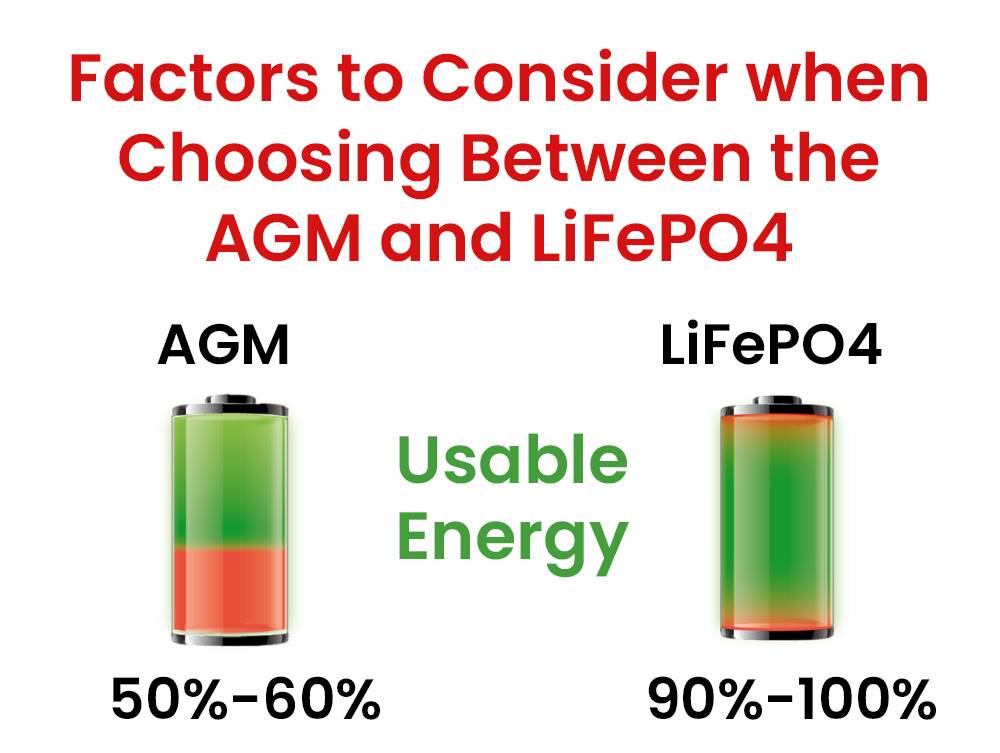
Choosing between LiFePO4 and AGM batteries requires careful consideration of various factors. Understanding your specific needs and priorities is crucial in making an informed decision.
- Intended Use:
- Identify the primary application for the battery, whether it’s for an RV, boat, solar power system, or other purposes. Tailoring your choice to your specific needs ensures optimal performance.
- Lifespan:
- LiFePO4 batteries generally offer a longer lifespan, enduring more charge cycles before requiring replacement. If longevity is a priority, investing in LiFePO4 technology may be advantageous.
- Weight and Size:
- Consider the weight and size of the batteries, especially if space or portability is a concern. LiFePO4 batteries are typically lighter and more compact, facilitating easier handling and installation in confined spaces.
- Charging Time:
- Evaluate the charging time of the batteries. LiFePO4 batteries generally boast faster charging times, providing quick recharging between uses. This is particularly beneficial for those heavily reliant on battery-powered equipment.
- Cost vs. Long-Term Benefits:
- While LiFePO4 batteries may have higher initial costs, it’s essential to weigh this against their longer lifespan and superior performance over time. Consider the overall cost-effectiveness and value of your investment.
Carefully assessing factors such as intended use, lifespan, weight, size, charging time, and cost will guide you in choosing the battery type that aligns best with your specific requirements, ensuring optimal value and performance.
Real-Life Applications
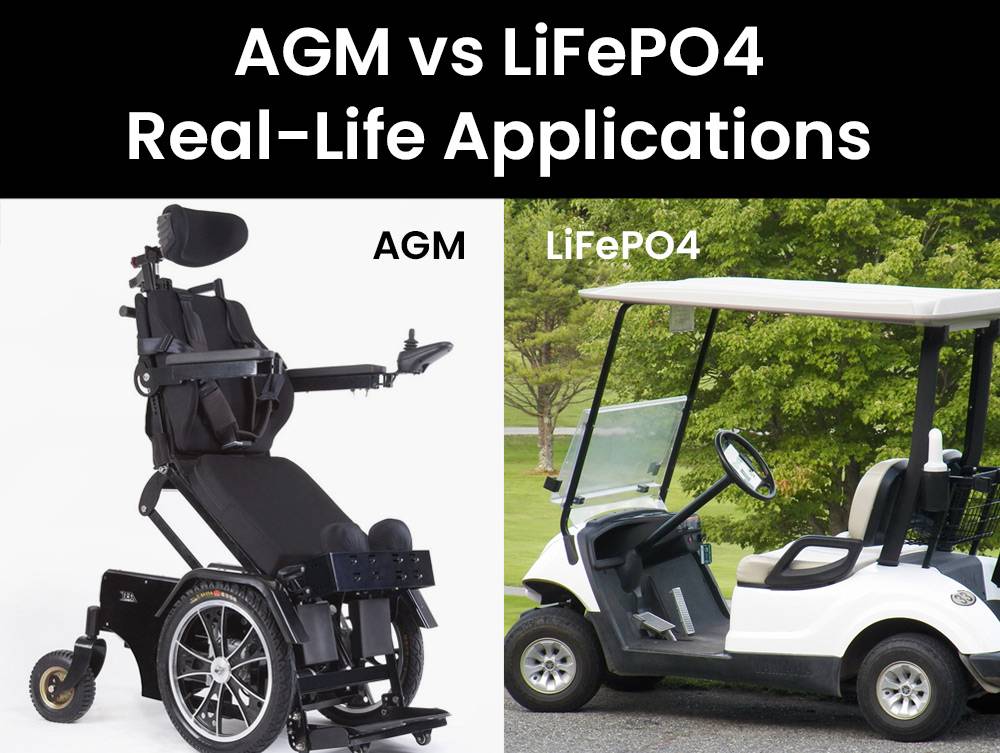
Exploring the real-life applications of LiFePO4 and AGM batteries unveils their diverse uses across different sectors. Understanding where each excels is crucial in making the right choice for your specific needs.
- LiFePO4 Batteries:
- Renewable Energy Systems: Ideal for storing solar or wind-generated energy, LiFePO4 batteries provide a reliable power source for sustainable solutions.
- Electric Vehicles (EVs): With high energy density and a longer lifespan, LiFePO4 batteries are increasingly adopted in electric vehicles, ensuring consistent performance.
- Marine Applications: Trusted in boats and yachts, LiFePO4 batteries withstand harsh conditions, making them reliable in marine environments.
- AGM Batteries:
- Backup Power Systems: Commonly used for backup power in homes, offices, and critical facilities, AGM batteries offer reliable performance during outages.
- Recreational Vehicles (RVs) and Camping: Favored by RV owners for minimal maintenance and fast recharge capabilities, AGM batteries suit recreational and camping needs.
- Medical Equipment: Crucial in powering medical devices, AGM batteries ensure uninterrupted operation in critical situations, such as ventilators and defibrillators.
Both LiFePO4 and AGM batteries cater to specific needs. LiFePO4 excels in longevity, energy density, and lightweight design, making it suitable for applications like renewable energy and EVs. AGM batteries, with their affordability and easy maintenance, find their place in backup power systems, recreational use, and crucial medical equipment. Before deciding, carefully weigh factors like cost, cycle life, charging requirements, and intended applications.
FAQs
How to maintain batteries when parked for extended periods?
Should RV batteries be in insulated or ventilated boxes?
What challenges do extreme temperatures pose for RV batteries?
How do FLA and LFP batteries handle high temperatures differently?
What are the effects of high heat on LiFePo batteries?
How to choose between Lifeline AGMs and LiFePo batteries?
More FAQs:
Is LiFePO4 better than AGM?
LiFePO4 (lithium iron phosphate) batteries offer several advantages over AGM (absorbent glass mat) batteries, including higher energy density, longer cycle life, faster charging, lighter weight, and better performance in a wider range of temperatures. However, the choice between LiFePO4 and AGM batteries depends on specific application requirements and budget considerations.
What is 100Ah lithium equivalent in AGM?
The equivalent capacity of a 100Ah lithium battery in AGM would depend on several factors, including the depth of discharge (DOD) and the specific energy density of the AGM battery. Generally, to achieve a similar capacity, you might need a larger Ah rating for an AGM battery compared to a lithium battery due to the differences in energy density and depth of discharge capabilities.
Is lithium worth it over AGM?
Whether lithium batteries are worth it over AGM depends on various factors, including the application’s requirements, budget considerations, and desired performance characteristics. While lithium batteries typically offer advantages such as higher energy density, longer cycle life, and faster charging, they also tend to have a higher upfront cost compared to AGM batteries.
What is the main disadvantage of an AGM battery?
One of the main disadvantages of AGM (absorbent glass mat) batteries is their relatively shorter cycle life compared to lithium batteries. AGM batteries also tend to be heavier and have slower charging rates than lithium batteries.
Is 100Ah lithium better than 200Ah AGM?
In terms of energy density, cycle life, and weight, a 100Ah lithium battery may outperform a 200Ah AGM battery. However, the choice between the two depends on factors such as specific application requirements, space limitations, and budget considerations.
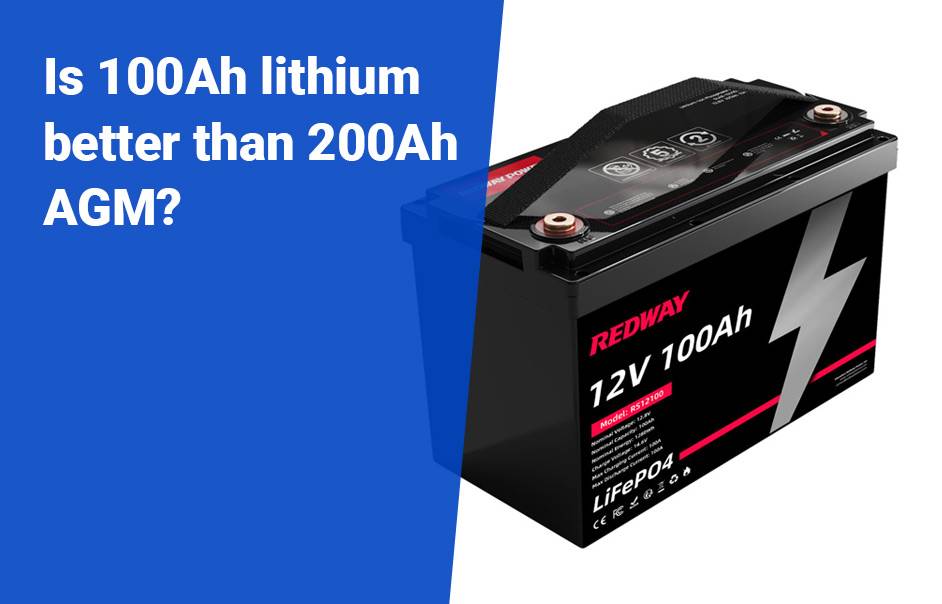
Can I swap out my AGM batteries with lithium?
In many cases, AGM batteries can be swapped out with lithium batteries, but it’s essential to ensure compatibility with the charging system and other components of the application. Additionally, some modifications may be necessary to accommodate the different charging characteristics and voltage requirements of lithium batteries.
Do AGM batteries last longer than lithium?
Generally, lithium batteries have a longer cycle life compared to AGM batteries. Lithium batteries can endure thousands of charge-discharge cycles with minimal degradation, while AGM batteries typically have a more limited cycle life.
Is AGM better than lithium in cold weather?
AGM batteries tend to perform better than lithium batteries in cold weather conditions, as they are less affected by temperature extremes. Lithium batteries may experience reduced performance and capacity in very cold temperatures, whereas AGM batteries can still operate effectively in such conditions.
Which is better AGM or lithium?
The choice between AGM and lithium batteries depends on specific application requirements, performance preferences, and budget considerations. Generally, lithium batteries offer advantages such as higher energy density, longer cycle life, and faster charging, while AGM batteries may be more cost-effective upfront and perform better in extreme temperature conditions.

